DRAFT
An overview of colonialism/paternalism
A synergy of privileging forces
The essay below will discuss the colonialism/paternalism head of the Hydra and argue how classism and racism are linked to colonialism/paternalism. Entire books have been written about the legacies of colonialism, so what appears below is only a primer. This essay (chapter) extends and reinforces the previous post (chapter) “Beginning a genealogy of privileging forces: racism, classism, and colonialism/paternalism”.
Virtually every global social problem is tied at least indirectly to the many legacies of 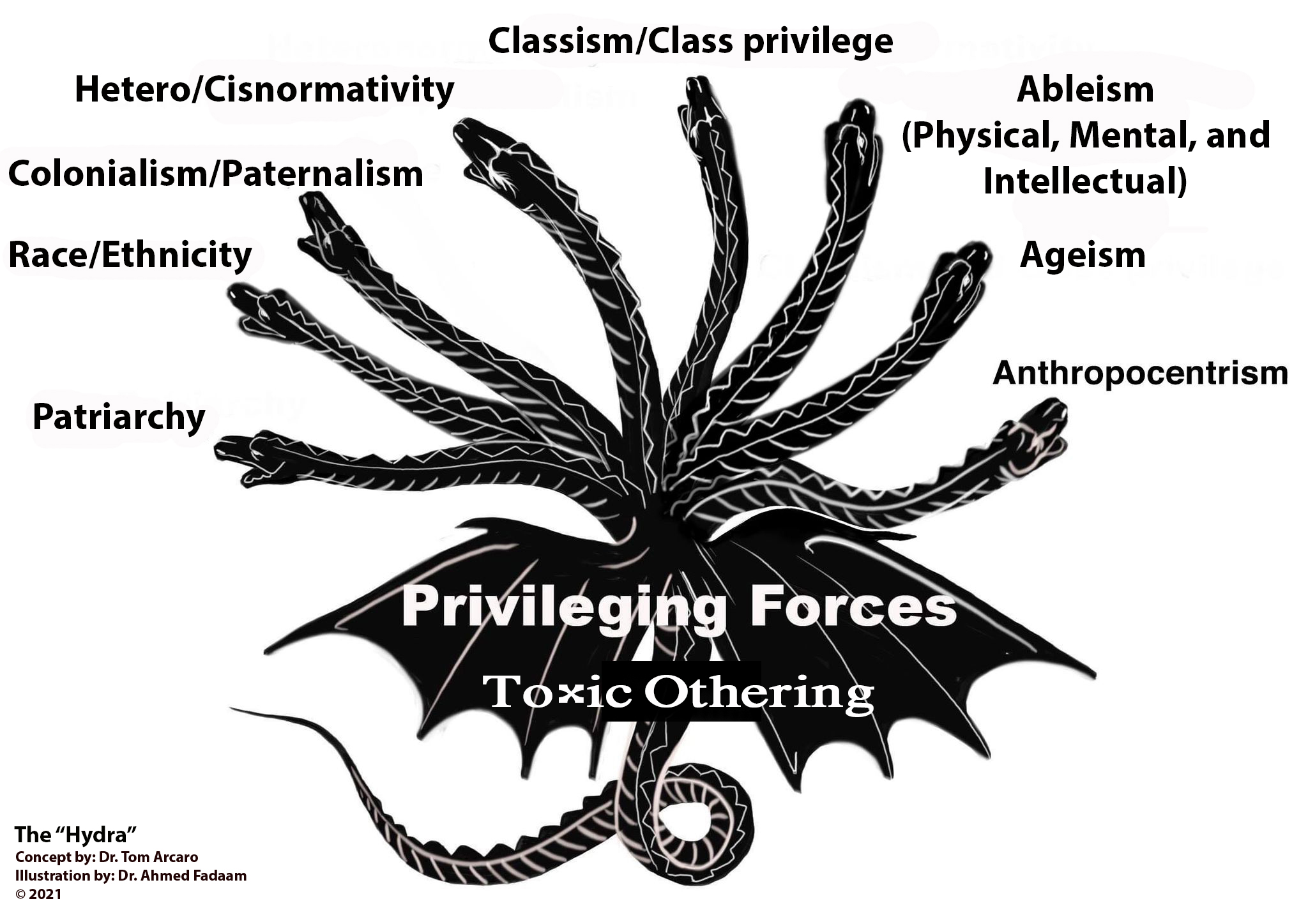 colonialism. We do not live in a postcolonial era (in the same way that the post-racial era is a myth). Until all formerly colonized peoples are free of the effects of colonialism, we still live in the colonial era despite the practice itself not occurring anymore, at least in its most overt forms.
colonialism. We do not live in a postcolonial era (in the same way that the post-racial era is a myth). Until all formerly colonized peoples are free of the effects of colonialism, we still live in the colonial era despite the practice itself not occurring anymore, at least in its most overt forms.
Can there be a reversal of the negative impacts of colonialism? That remains to be seen.
The language of colonialism
Important to point out is that this is being written in English, the language of colonization. At the height of its influence, the British empire was so large that it was said that “the sun never sets on the British empire“. In the early 1900’s the British empire had establishments in Africa, Asia, Europe, America, and numerous islands, across the globe with nearly one fourth of the total human population under its dominion.
That English is spoken in Bangladesh, Myanmar, Kenya, Jordan, and all the other locations where refugees are being contained is no accident. It is a perfect example of the extended and pervasive legacy of colonization. One way to think about this is that we all live in a world that was created by dead people. That is to say, the world we live in now characterized by various stages of post colonialism was created literally hundreds of years ago, and we continue to live with the impacts of decisions made by rulers that no longer exist. That said, there is still a considerable number of people on the planet that consider King Charles III of England their ultimate ruler.
Language is not neutral. We know from the Whorf-Sapir hypothesis (also know as linguistic relativity theory) that human thought is shaped by the language one uses. Reading, writing, and thinking in English invades the mental space of those who’s native language is Arabic, Swahili, or Bengali. How would discourse about colonialism be different were it to be conducted in a non-colonizer language? Perhaps we will never know the answer to this question, but it is worth noting that linguistic privilege is a sub-set under the colonialism/paternalism head of the Hydra.
The Age of Discovery and the ‘doctrine of discovery’ = overt ethnocentrism and racism
Capitalism is an inherently expansionistic economic system which demands ever increasing access to raw materials (e.g., rubber, cotton, and spices) and cheap labor. The rise of a more advanced capitalism in Europe coupled with an unchecked power structure of monarchs and other elites lead inevitably to the so called “Age of Discovery’ which began in the 1400’s. These efforts to explore, conquer, and exploit -and, yes, colonize- the entire ‘uncivilized’ globe were given theological and legal support by the most important European religious leaders of this time. The ‘doctrine of discovery” is based on public decrees make by Catholic Popes Nicholas V and Alexander VI in the late 1400’s. Using these decrees, European leaders and monarchs justified international (read: Western European) laws granting ownership rights to lands ‘discovered’ and occupied during the ‘age of discovery’. Colonization was the divine right of first, all Catholic nations (e.g., Spain and Portugal) and then by international agreement the right of all other Western nations, including eventually the then new United States of America. The indigenous peoples who happened to be living in these newly ‘discovered’ lands were seen as souls to be saved. In the United States, the term Manifest Destiny must be seen as an extension to the doctrine of discovery. It was used to explain that white settlers had a divine right and even responsibility to expand westward, spreading white supremacy, capitalism, and Christianity while ignoring the rights of the indigenous peoples.
In a recent [March 2023] press release the Catholic Church addressed the error in the ‘doctrine of discovery’ noting that,
“It is in this context of listening to indigenous peoples that the Church has heard the importance of addressing the concept referred to as the ‘doctrine of discovery.’ The legal concept of ‘discovery’ was debated by colonial powers from the sixteenth century onward and found particular expression in the nineteenth century jurisprudence of courts in several countries, according to which the discovery of lands by settlers granted an exclusive right to extinguish, either by purchase or conquest, the title to or possession of those lands by indigenous peoples.”
Explaining further that,
“...their [the colonized indigenous people’s across the globe] sufferings constitute a powerful summons to abandon the colonizing mentality and to walk with them side by side, in mutual respect and dialogue, recognizing the rights and cultural values of all individuals and peoples.”
In 1537 Pope Paul III essentially reversed the decrees made by Popes Nicholas V and Alexander VI and upheld the rights of indigenous peoples reversing the overtly ethnocentric and racist decrees previously published. But a door once opened, especially one with riches on the other side, is hard to close. Once begun and justified, the Age of Discovery and ‘Manifest Destiny’ moved forward with rapacious speed and energy and have left behind numerous negative legacies. Here is how the US based Upstander Project summarizes the impact of the Doctrine of Discovery,
“This ideology supported the dehumanization of those living on the land and their dispossession, murder, and forced assimilation. The Doctrine fueled white supremacy insofar as white European settlers claimed they were instruments of divine design and possessed cultural superiority.”
The Age of Discovery and the ‘doctrine of discovery’ embodied and enacted overt ethnocentrism and racism all over the colonized world and these impacts continue to be felt now by literally billions of humans across the globe. Though the phrase ‘white-savior industrial complex’ did not come into popular usage until the 21st century, the elites in Europe and the United States fully embodied this racist mentality during the ‘age of discovery.’ George Orwell’s book 1984 describes how those in power use sanitizing words to disguise acts of oppression. Though he was referring to a future world of totalitarianism, his words describe with precision the logic behind using the phrase ‘the age of discovery’. Were this epoch to be described by those being colonized they would perhaps it would be more accurately called ‘the age of rape, racism, and avarice.’
Africa divided
Western European nations literally divided up most of the continent in the late 1800s scramble for extracting wealth from the continent. In 1884, European leaders met for many weeks at the now infamous West African Conference of Berlin with the purpose of dividing Africa. These leaders discussed and negotiated the rules for the conquest of Africa, legitimating the denial of any indigenous agency or question of sovereignty. In the months and years afterwards, just as in the Middle East, national lines were drawn without respect to cultural, tribal, or linguistic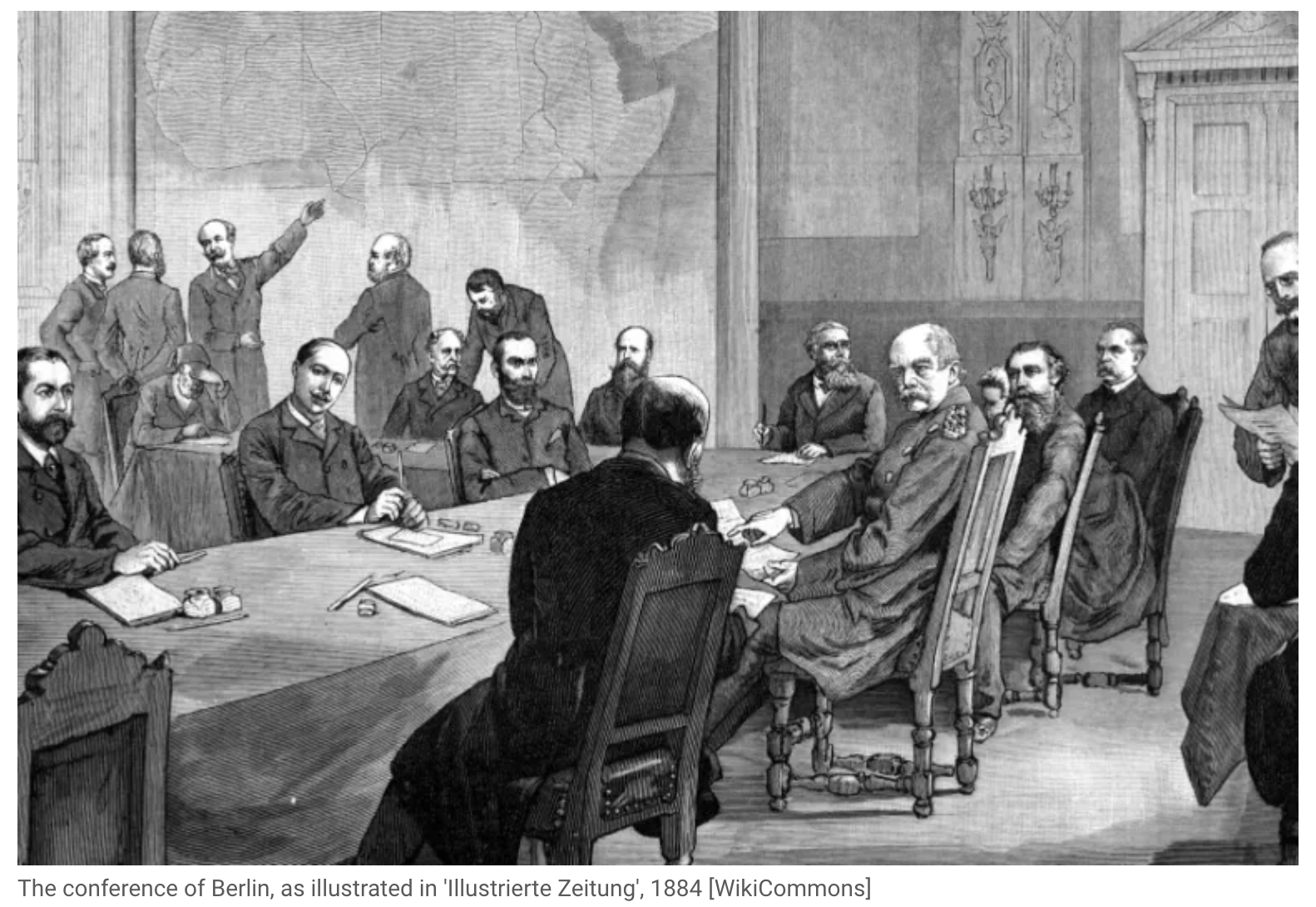 population centers.
population centers.
There is no doubt these actions were overtly racist. In the words of French diplomat Jules Ferry in a speech before the Chamber of Deputies, March 28, 1884,
“Gentlemen, we must speak more loudly and more honestly! We must say openly that indeed the higher races have a right over the lower races . . . .
I repeat, that the superior races have a right because they have a duty. They have the duty to civilize the inferior races . . . . In the history of earlier centuries these duties, gentlemen, have often been misunderstood; and certainly when the Spanish soldiers and explorers introduced slavery into Central America, they did not fulfill their duty as men of a higher race.”
The rhetoric used to justify this carving up of a continent included three promises. First, all slave trade was to be ended, secondly, the peoples of Africa would be taught the love of Christ, and finally they would be civilized, freed from their primitive ways of life. These three promises perfectly exemplify toxic othering. This rhetoric of benevolence, as we know now, was just a thin veneer over the real motivation, more money and power for the elites. One irony of history is that the anti-slave movements in the UK and the USA during the mid-1800’s provided some of the very language that was used in Berlin and by King Leopold to provide public cover for their nefarious actions.
I find the use of the concept of ‘civilization’ here to be particularly perverse and ethnocentric to the core. Prior to European contact, the peoples of Africa though certainly less technologically advanced were extraordinarily civilized, their cultures advanced in art, diplomacy, philosophy, and all other markers of civilization. The colonizing powers normalized the notion that all non-Western nations were ‘primitive’ and hence inferior, particularly the cultures found in sub-Saharan Africa. This served to embed the concept of races -and hence racism- into the colonizers mindset, a legacy still dominating the globe manifesting itself as ‘white supremacy.’ This all in the name of creating more wealth for Western elites like King Leopold in Belgium.
By the end of the 1800’s 90% of the land mass of the second largest continent on the planet had been effectively raped, robbed, and dominated by the colonizing nations, their machine guns ruling the day.
Some of the nations in sub-Saharan Africa emerged from colonization resilient and ready to face a next chapter. Ghana and Zambia might be two examples of this. Other African nations were left with chronic problems, plagued by having narcissistic and kleptomaniacal leaders who had only their own best interest in mind, the history of Zimbabwe under the leadership of Robert Mugabe is perhaps a good example of this.
No human is less human than other humans
Getting rid of all legacies of colonialism may not be possible. What is possible, though, is that we become more deeply aware of how these legacies play into the continued marginalization of so many peoples around the planet.
A critical first observation when beginning a discussion about colonization is that, according to the Universal Declaration of Human Rights, signed in 1948, all humans are equal, and all humans deserve to live lives of dignity, ensured of having the basics of food, education, and security.
Granting that premise, the history of colonization is most assuredly a history of one group acting on the belief they were superior to another group. Though at the beginning of colonization the concept of race was not being explicitly used, this particular form of malignant ethnocentrism was the norm for colonizing nations. Colonization is in all cases, exploitation and oppression of the culture being colonized. The colonizer may use all kinds of rhetoric, including religious dogma to justify what they are doing, but in all cases, colonization is exploitation, the extraction of natural resources and/or human resources for the profit of those in the colonizing nation. Colonization never has a net positive impact on those colonized, just the opposite, colonization always means marginalization and oppression.
It is both deeply ironic and instructive that rulers like King Leopold of Belgium and all of the white elites that attended the West African Conference of Berlin in 1884-85 used the justification they were fighting the slave trade and ‘bringing civilization’ to explain their racist behaviors. Though the North won the Civil War in the United States and thus underlined the fact that slavery was wrong, in 1883 it was an American President Chester A. Arthur who agreed to support Leopold’s Free Congo State and urged other European leaders to do the same. The US Civil War addressed the issue of slavery but ignored the global rise of racism.
Civilization ≠ technological mastery
Colonization is made possible by the technological superiority of one culture over another. One point to make clear is that technological superiority, as in the case of weapons or forms of transportation, or other technologies, does not equate to a more advanced civilization. I think this is one of the fundamental misunderstandings that allowed for colonization. The assumption was that civilization and technological advancement were a couple together. A culture without advanced technology appeared more ‘primitive’ through the warped ethnocentric lens of the colonizer.
In 1935 Margret Mead published her seminal work Sex and Temperament in Three Primitive Societies . This book is noteworthy for many reasons, but I will call attention to the use of the word ‘primitive’ in the title. The accepted antonym to this word at that time in history (and even now?) is the word ‘civilized.’ Mead’s book title choice illustrates that the embedded ethnocentrism and racism in Western culture runs deep.
Overt colonization has ceased, but the long-lasting consequences of colonization continue to infect all parts of the global south. One key aspect of colonization is that the colon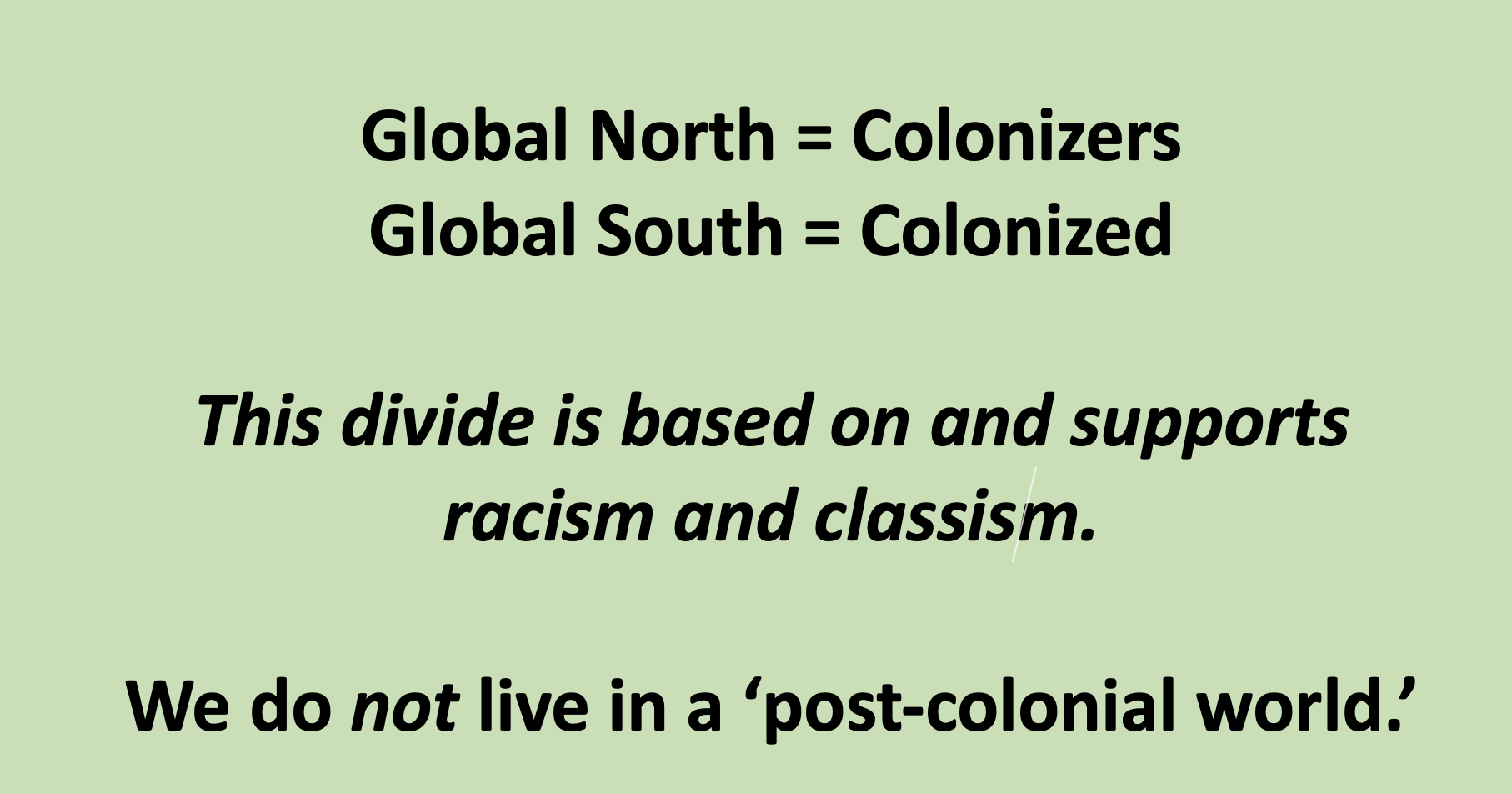 izer takes over the political in the economic system of the colonized country, and modifies those systems, to maximize the efficiency of the value extraction from the colony. The indigenous system of politics, and the (typically subsistence) economy of the colonized nation is changed in such a way as to make the colonized population more dependent upon the colonized power. When the colonizer chooses to leave, or as in many cases, is forced to leave by political action among the colonized people, what is left behind is typically a dysfunctional economy and a poorly functioning political system. In many cases, this political system is dominated by the military, as in the case of Myanmar (formally Burma) that was colonized by the British people.
izer takes over the political in the economic system of the colonized country, and modifies those systems, to maximize the efficiency of the value extraction from the colony. The indigenous system of politics, and the (typically subsistence) economy of the colonized nation is changed in such a way as to make the colonized population more dependent upon the colonized power. When the colonizer chooses to leave, or as in many cases, is forced to leave by political action among the colonized people, what is left behind is typically a dysfunctional economy and a poorly functioning political system. In many cases, this political system is dominated by the military, as in the case of Myanmar (formally Burma) that was colonized by the British people.
Many people (including me) use the language of ‘Global South’ and ‘Global North’ to talk about the world today. Whenever you hear these terms, it is accurate to label those from the ‘Global North’, as being historically the colonizers, and those from the Global South as the colonized. In earlier times these were referred to as Third World nations, a sanitized and overtly ethnocentric way of referring to those nations who were recovering from the cancer of colonization. In a similar vein, the use of the phrase ‘New World’ is overtly Western-centric. Ample evidence indicates there were were humans living in what is now North and South America as long as 20,000 years ago, long before agriculture gave rise to state societies anywhere on our Earth.
Colonization and capitalism
Colonization can be seen as a as an extension of capitalism. Colonizers wanted to maximize their power and wealth, and to do so they needed to colonize everywhere they could around the planet. But it was not the typical citizen of say Portugal or Great Britain who wanted this expansion and this domination. It was the leaders of these colonizing nations who were intoxicated by power and wealth seeking to sate what appears to be unquenchable search for ever more power. The riches that were stolen from the colonized peoples were never distributed evenly among the people of the colonizing nation but rather went into the pockets of the rich and powerful ultra-bourgeoisie, the classism head of the Hydra justifying and insuring this inequality.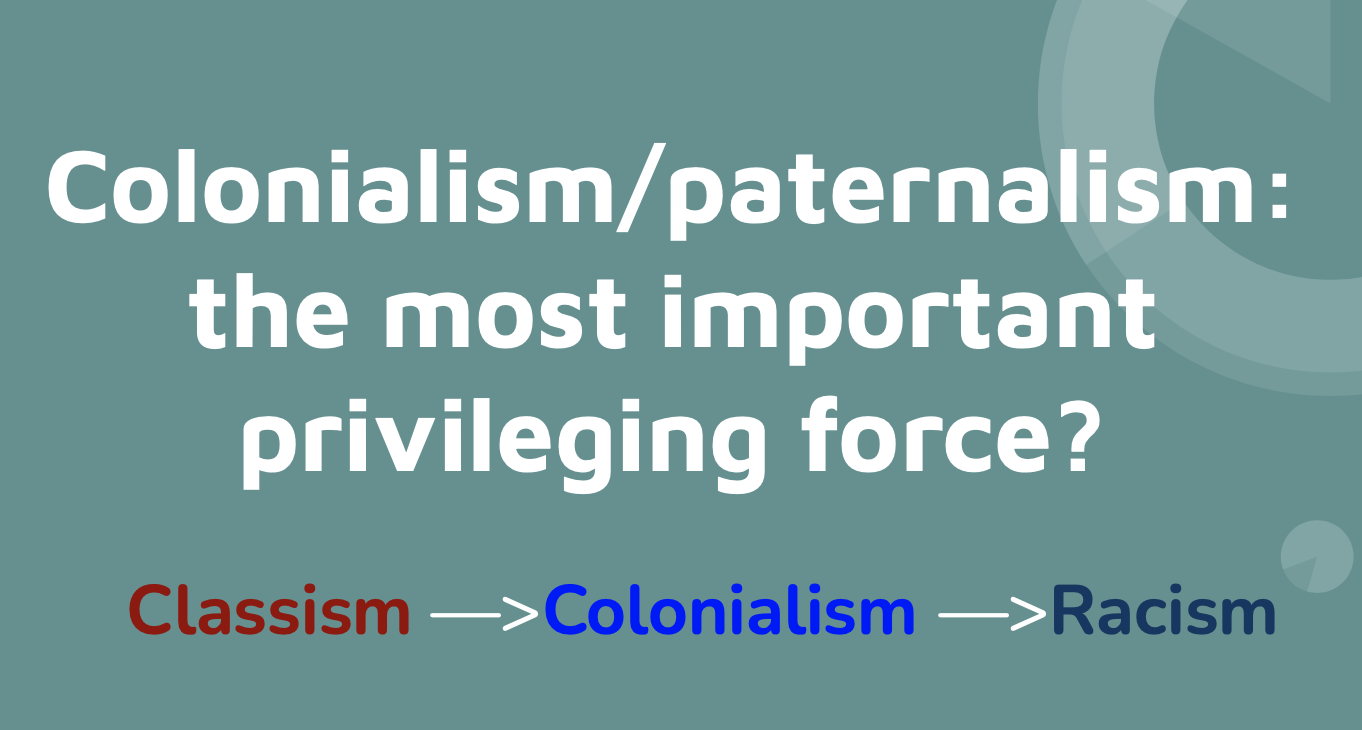
Perhaps the most extreme example of this is King Leopold in Belgium, who from 1885-1908 literally had personal ownership of the Congo Free State, and is arguably responsible for the largest genocide in human history, the killing more than 10,000,000 Congolese over his time in control of this part of Africa. Leopold was there and imposed his power only to increase his own wealth. Leopold used the rhetoric of “spreading Christianity“ as a way of justifying what he was doing. This is a perfect example of how religion was used to justify colonization.
The Portuguese and the Spanish were very adept at using this kind of proselytizing in the New World in spreading Catholicism, the typical citizens who were hearing about these overseas adventures were fed stories of how primitive, uncivilized savages were being turned in to “saved souls’: greed rebranded into benevolence using ethnocentric assumptions. Key to keep reminding ourselves is that colonization is inferred and extreme ethnocentrism, and thus dehumanization of the other, that is, pushing the assumption that everybody that was being colonized was inherently inferior to -that is less than human- compared to the colonizer. Colonization gives rise to the acceptance of racism and racist actions including the use of slavery at a level never before seen in world history.

Paternalism and Western Asia
The head of the Hydra that we are talking to right now is ‘colonization/paternalism.’ Paternalism is when one nation or a group of nations decides the fate of large swaths of the globe. This is the case of the Middle East, where western Europeans from the UK, France, Italy, and the United States, decided the fate of the peoples in the Middle East after both World Wars, I and II. There are no Middle Eastern (aka Western Asia) scholars who can ignore the 1917 Balfour Declaration and the 1918 Sykes-Picot Agreement, documents drawn up by the colonial powers in what Russian leader Vladimir Lenin perhaps accurately called “the agreement of the colonial thieves”. Lines were drawn and new nations were created by colonial powers. Many have argued, I think, convincingly, that these lines were drawn in such a way as to maximize internal discord, mixing religious, ethnic, and linguistic groups so as to make national harmony both before and after decolonization a very difficult goal to achieve. Unstable nations are easier to control.
Perhaps one of the most egregious paternalistic acts was the creation of Israel without a specific plan for the Palestinian peoples. In 1948 this new nation was created in the wake of World War II, while at the same time ignoring and hence marginalizing the existence of the Palestinian people. This lack of a Palestinian state, or at least, an assurance that Palestinians would have equal and full citizenship in the new state of Israel is a constant cause of conflict, as much now in 2023 as it had been since 1948. I find it troubling that though the Balfour Declaration does speak of a “national home for the Jewish people” it also specifies that “…it being clearly understood that nothing shall be done which may prejudice the civil and religious rights of existing non-Jewish communities in Palestine…”
A similar conflict was created when the Kurdish people were spread among four different newly created nations, a recipe for chronic conflict. Though a Kurdistan was at one point proposed, it never came to be. As we can see, the paternalistic actions of the western European and United States leaders have led to chronic issues in the Middle East. Just as in the case of the ‘African scramble’ described above, small groups of elite white males made decisions both for and about countless peoples over whom they felt superior. Toxic othering at its worst.
Three heads linked together
The Hydra heads of colonialism and classism must be linked together with racism. Added as fuel to this mix, capitalism is an inherently expansionistic economic system, and is also a good vehicle for enhancing the power of most privileging forces. As we know from world history, about 5000 years ago after the rise of agriculturally focused state societies most cultures had a small elite at the top, kings, queens, monarchs, and holy rulers of all sorts. These people used their power to 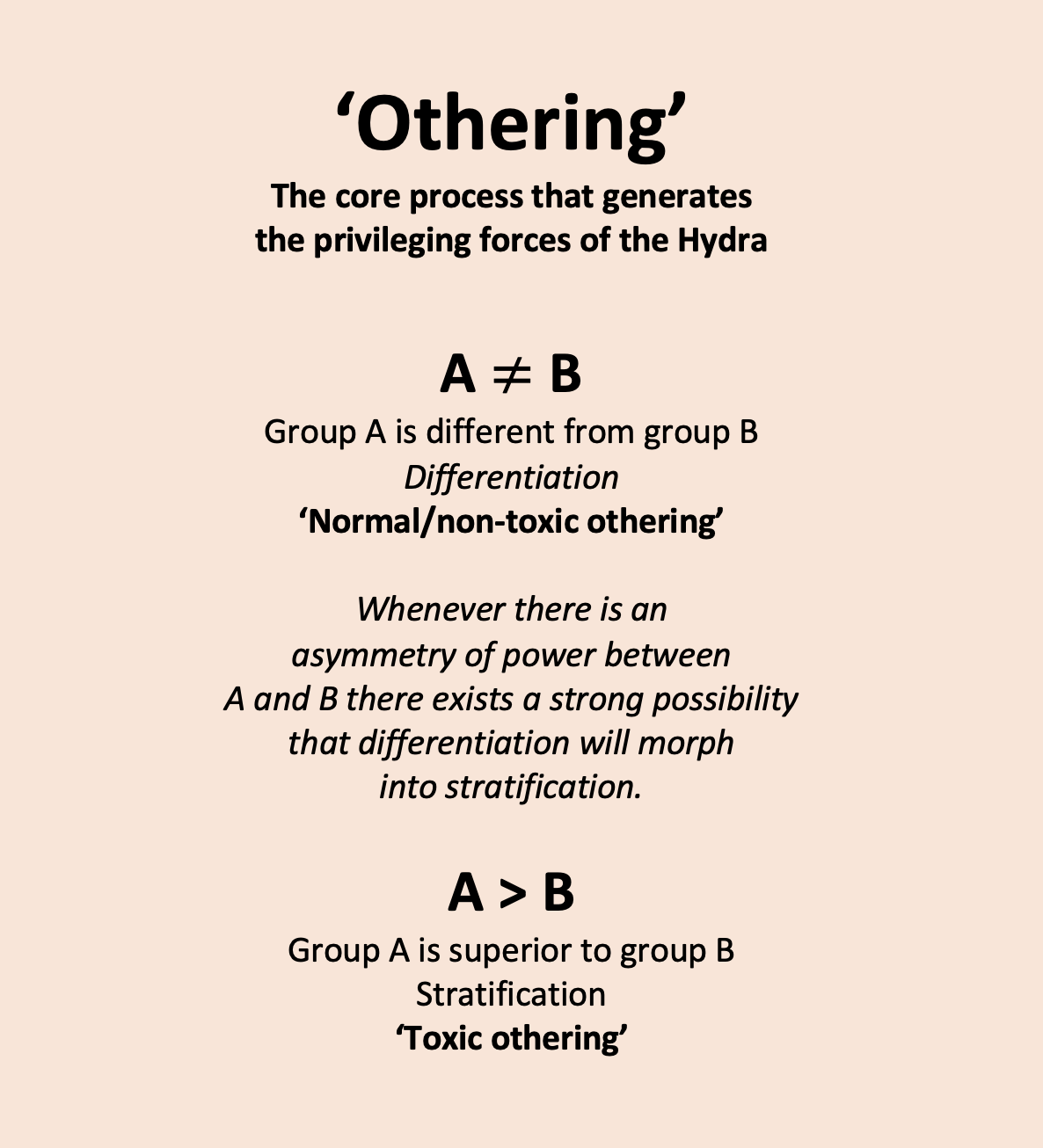 convince those under them that their expansionistic actions were in everyone’s benefit and were, not only the divine right of those doing the colonizing, but a responsibility of those doing the colonizing. Civilizing and saving savages was what colonization was all about and the concept of race was popularized to help justify this global expansion of oppression. Capitalism led to colonialism and colonialism exasperated and enhanced the assumptions of ethnocentrism and racism.
convince those under them that their expansionistic actions were in everyone’s benefit and were, not only the divine right of those doing the colonizing, but a responsibility of those doing the colonizing. Civilizing and saving savages was what colonization was all about and the concept of race was popularized to help justify this global expansion of oppression. Capitalism led to colonialism and colonialism exasperated and enhanced the assumptions of ethnocentrism and racism.
Critical Hydra Theory done properly must look long into the past. The general -and distressing pattern- is that once an inequality of power is established, those in power work toward justifying and normalizing these asymmetries, ossifying the social structures, enabling and ensuring toxic othering to become a ‘normal’ part of life.
The process of confronting toxic othering is slow and difficult, but it must be the task of everyone interested in creating a more just world for all.


 Follow
Follow